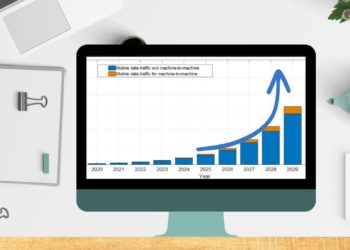Is your business phone system ready for the future? As the way we work continues to evolve, so do the technologies that support daily communication. The rise of remote teams, digital-first customers, and AI-powered workflows means that your phone service must do much more than just connect calls.
In 2025, a business phone service is no longer just a tool—it’s a strategic asset. The right system can improve productivity, reduce costs, and enhance customer satisfaction. Whether you’re running a startup or managing multiple office locations, here are the key features and trends to look for in a phone service that’s built for the future.
Cloud-Based Systems Are Becoming the Standard
Traditional landlines are quickly becoming obsolete. Cloud-based business phone systems offer unmatched flexibility, allowing businesses to scale communication across locations, support remote teams, and manage calls from any device with an internet connection.
A good example of this shift is Comexcel Technologies Corporation, which provides cloud-based phone services tailored to various industries. With features that support remote work, multi-location management, and easy integration, Comexcel reflects the direction many businesses are heading—toward more agile, internet-driven communication platforms.
In addition to flexibility, cloud-based phone services offer businesses better uptime and disaster recovery. Since calls are routed over the internet and managed through remote servers, downtime is minimized, and companies can maintain operations even during power outages or local disruptions.
Integration With CRM and Business Tools
In 2025, seamless integration is non-negotiable. Businesses expect their phone systems to work hand-in-hand with CRMs, help desks, calendars, and collaboration platforms. When your phone service connects directly with tools like Salesforce, HubSpot, Zendesk, or Microsoft Teams, your team can access customer information instantly and reduce time spent switching between apps.
These integrations boost productivity by reducing friction in day-to-day operations. For example, sales teams can call clients directly from within the CRM, log call data automatically, and set follow-up reminders without leaving the platform. Support agents benefit too—knowing the caller’s history before picking up helps them resolve issues faster and more effectively.
Beyond the basics, some phone services allow for advanced analytics and workflow automations. You can trigger actions based on missed calls, track performance metrics, or set up alerts when high-value customers call. These insights enable smarter decision-making and stronger customer relationships.
AI-Powered Features Are No Longer Optional
Artificial intelligence is reshaping the way businesses manage communication. In 2025, top-tier phone services will offer AI tools such as smart call routing, voice-to-text transcription, and sentiment analysis. These features not only improve efficiency but also provide valuable insights into customer interactions.
Smart routing systems can direct calls based on time of day, caller behavior, or previous interactions. This ensures that customers are connected with the right department or person the first time, reducing frustration and improving satisfaction. AI assistants can also act as intelligent auto-attendants, answering common questions or booking appointments without involving a human.
Transcription tools powered by machine learning provide accurate, searchable records of calls that can be used for training, compliance, or follow-up. Sentiment analysis tools can even detect when a customer is upset and flag the call for review, helping businesses proactively address issues before they escalate.
As AI becomes more advanced, expect these features to move from “nice-to-have” to essential in staying competitive.
Enhanced Security and Compliance Standards
With rising cybersecurity threats and increasing data privacy regulations, security is a top concern for any business phone system. In 2025, your provider should offer built-in protections such as end-to-end encryption, multi-factor authentication, and robust user access controls.
A secure phone service protects not only internal conversations but also customer data, particularly sensitive information shared during support or billing calls. Breaches can lead to legal consequences, reputational damage, and financial loss. That’s why many providers now include encrypted voicemail, secure messaging, and call redaction tools.
For companies in healthcare, finance, or legal sectors, regulatory compliance is a must. Phone systems must meet standards like HIPAA, GDPR, or CCPA, ensuring that call recordings and data storage are handled with care. Look for systems that offer role-based permissions, automated data retention settings, and detailed audit logs to support these requirements.
In addition to technical safeguards, providers should offer ongoing security updates, 24/7 monitoring, and rapid response in case of suspicious activity. When evaluating options, don’t hesitate to ask about their security protocols and compliance certifications.
Transparent Pricing and Scalable Plans
One of the biggest mistakes a business can make is underestimating how much a phone system will actually cost. In 2025, the best providers offer clear, predictable pricing with no hidden fees. Whether you’re a solo entrepreneur or running a multi-location company, there should be a plan that fits your budget and scales with you.
Transparent pricing makes budgeting easier and helps prevent unpleasant surprises. Look for providers that clearly outline what’s included, such as international calling, voicemail transcription, or video conferencing, and which features cost extra. Month-to-month billing or annual contracts should be flexible, without long-term penalties.
Scalability is just as important. A growing business needs a phone system that can grow with it, adding users, lines, and features without costly overhauls. For seasonal businesses or teams with freelancers, the ability to add or remove access on demand can save significant money over time.
Also, consider support availability. As your system becomes more central to operations, timely help becomes critical. Providers that offer live chat, phone, and email support give you peace of mind as your business evolves.
Future-Proof Your Business Communication
The business phone service landscape in 2025 is smarter, more connected, and more flexible than ever. From cloud-based systems and AI tools to security compliance and CRM integration, today’s phone platforms are built to support modern businesses in real time.
Choosing a provider that offers industry-specific features, reliable cloud infrastructure, and transparent pricing can give your business a competitive edge. Don’t settle for outdated systems. Instead, invest in communication that grows with you.
Whether you’re upgrading for remote teams, customer service, or operational efficiency, now is the time to align your phone system with the future of work. The right tools don’t just support business—they help it thrive.











































































